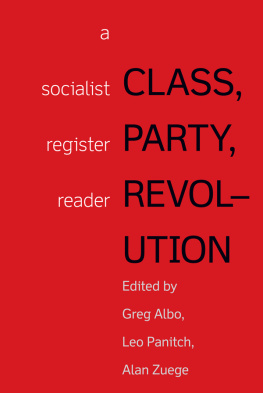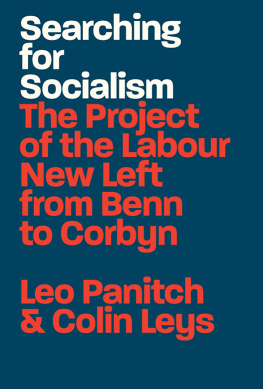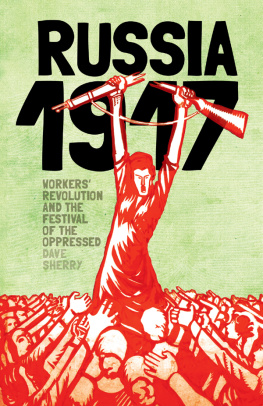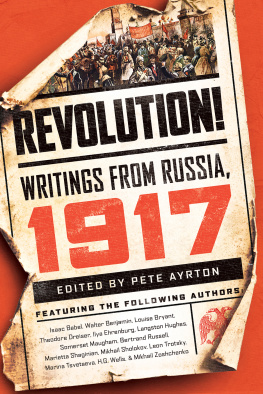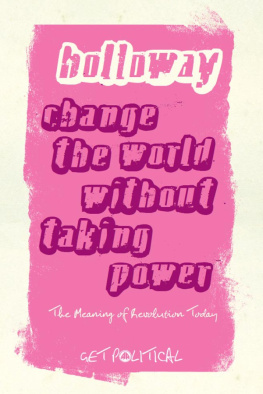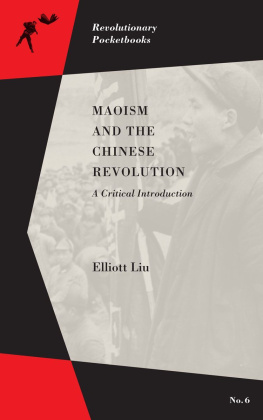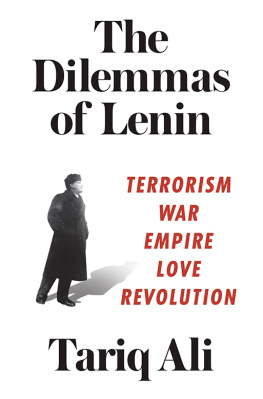SOCIALIST
REGISTER
2017
THE SOCIALIST REGISTER
Founded in 1964
EDITORS
LEO PANITCH
GREG ALBO
FOUNDING EDITORS
RALPH MILIBAND (1924-1994)
JOHN SAVILLE (1916-2009)
ASSOCIATE EDITORS
COLIN LEYS
ALFREDO SAAD-FILHO
ASSISTANT EDITOR
ALAN ZUEGE
EDITORIAL ASSISTANT
STEPHEN MAHER
CONTRIBUTING EDITORS
BASHIR ABU-MANNEH
GILBERT ACHCAR
AIJAZ AHMAD
ELMAR ALTVATER
HENRY BERNSTEIN
PATRICK BOND
ATILIO BORON
JOHANNA BRENNER
PAUL CAMMACK
VIVEK CHIBBER
GEORGE COMNINEL
MADELEINE DAVIS
BARBARA EPSTEIN
BILL FLETCHER JR
SAM GINDIN
BARBARA HARRISS-WHITE
DAVID HARVEY
JUDITH ADLER HELLMAN
CHRISTOPH HERMANN
NANCY HOLMSTROM
URSULA HUWS
RAY KIELY
MARTIJN KONINGS
HANNES LACHER
LIN CHUN
MICHAEL LOWY
EBNEM OUZ
CHARLES POST
ADOLPH REED JR
STEPHANIE ROSS
SHEILA ROWBOTHAM
JOHN S. SAUL
MICHALIS SPOURDALAKIS
HILARY WAINWRIGHT
To get online access to all Register volumes visit our website
http://www.socialistregister.com
SOCIALIST
REGISTER
2017
RETHINKING REVOLUTION
Edited by LEO PANITCH and GREG ALBO

First published in 2016
by The Merlin Press Ltd.
Central Books Building
Freshwater Road
London
RM8 1RX
www.merlinpress.co.uk
The Merlin Press, 2016
British Library Cataloguing in Publication Data is available from the British Library
ISSN. 0081-0606
Published in the UK by The Merlin Press
ISBN. 978-0-85036-725-6 Paperback
ISBN. 978-0-85036-724-9 Hardback
Published in the USA by Monthly Review Press
ISBN. 978-1-58367-633-2 Paperback
Published in Canada by Fernwood Publishing
ISBN. 978-1-55266-911-2 Paperback
Printed in the EU on behalf of Stanton Book Services, Wellingborough, Northants
CONTENTS
Leo Panitch Greg Albo |
Bryan D Palmer Joan Sangster |
Leo Panitch Sam Gindin |
Jodi Dean |
Hilary Wainwright |
Fabien Escalona |
Andreas Malm |
David Schwartzman |
Patrick Bond |
Robert Cavooris |
Steve Striffler |
Pierre Beaudet |
August H Nimtz |
A W Zurbrugg |
Wang Hui |
Adolph Reed, Jr |
Walter Benn Michaels |
Slavoj iek |
Leo Panitch |
CONTRIBUTORS
Pierre Beaudet teaches International Development and Global Studies at the University of Ottawa, and is the founder of the Quebec NGO Alternatives, and Editor of the Nouveaux cahiers du socialisme.
Patrick Bond, who directed the Centre for Civil Society at the University of KwaZulu-Natal since 2004, is now professor in the School of Governance at the University of Witwatersrand. Johannesburg, South Africa.
Robert Cavooris is a graduate student in the History of Consciousness Department, University of California, Santa Cruz.
Jodi Dean teaches political philosophy in the Political Science department at Hobart and William Smith Colleges in Geneva, New York.
Fabien Escalona is a teacher and researcher at Sciences Po, Grenoble and the Centre dtude de la vie politique (Cevipol) at Universit libre de Bruxelles.
Wang Hui is a professor in the Department of Chinese Language and Literature, Tsinghua University, Beijing.
Sam Gindin, the former chief economist and director of research for the Canadian Auto Workers union, is an adjunct professor in the political science department at York University, Toronto.
Andreas Malm teaches human ecology at Lund University, Sweden.
Walter Benn Michaels is an American literary theorist who teaches at the University of Illinois at Chicago.
August Nimtz, Jr is a professor of political science at the University of Minnesota in Minneapolis.
Bryan Palmer is emeritus professor of history at Trent University, Peterborough, Ontario and editor of the journal Labour/Le Travail.
Leo Panitch is emeritus professor of political science at York University, Toronto. Since 1985, he has served as co-editor of the Socialist Register.
Adolph L. Reed, Jr is a professor of political science at the University of Pennsylvania, specializing in race and American politics.
Joan Sangster holds the Morton Chair in History at Trent University, Peterborough, Ontario.
David Schwartzman is Professor Emeritus in the Department of Biology at Howard University, Washington, D.C.
Steve Striffler is the Doris Zemurray Stone Chair in Latin American Studies and Professor of Anthropology at the University of New Orleans.
Hilary Wainwright, editor of Red Pepper magazine, is a Fellow of the New Politics Project of the Transnational Institute in Amsterdam.
Slavoj iek is senior researcher at the Institute for Sociology and Philosophy at the University of Ljubljana, Global Distinguished Professor of German at New York University, and international director of the Birkbeck Institute for the Humanities of the University of London.
A.W. Zurbrugg is publisher at The Merlin Press, London.
PREFACE
This 53rd volume of the Socialist Register addresses the question of the meaning of revolution in the twenty-first century. Coming to terms with the legacy of 1917 is obviously one aspect of this. October was a unique event that provided inspiration for millions of oppressed people, and also became an inevitable point of reference for socialist politics in the twentieth century. The twenty-first century left needs to both understand and transcend this legacy through a critical reappraisal of its broad effects both positive and negative on political, intellectual and cultural life everywhere as well as on the other revolutions that took place over the last century. But the main point of the volume is to look forward more than back.
All revolutions emerge in conjunctures saturated with unique contradictions, contingencies, class alignments and struggles. This concrete confluence of forces constitutes the political conditions that revolutionaries must not only understand, but also act and organize within. The political event of gaining state power, whether by taking parliament or in a collapse of the existing political regime, has proven time and again to be less crucial than the social revolution of building capacities for self-government and the democratization and socialization of institutional resources. The event, in itself, may be a dramatic rupture that opens up new political possibilities and imaginaries bursting beyond the limited horizons of capitalist market calculation. But it will never be a sufficient condition for the exploited and oppressed to build their own capacities for establishing collective, rather than competitive, ways of living through developing socialist democracy. There is a need, in this context, for the left to maintain an openness to, and patience with, the quite varied experiments in social alternatives to neoliberalism as they emerge in the current period. It is anything but clear where new space for projects of structural reform might open up, or more profound ruptures might suddenly burst onto the political scene.
Next page

